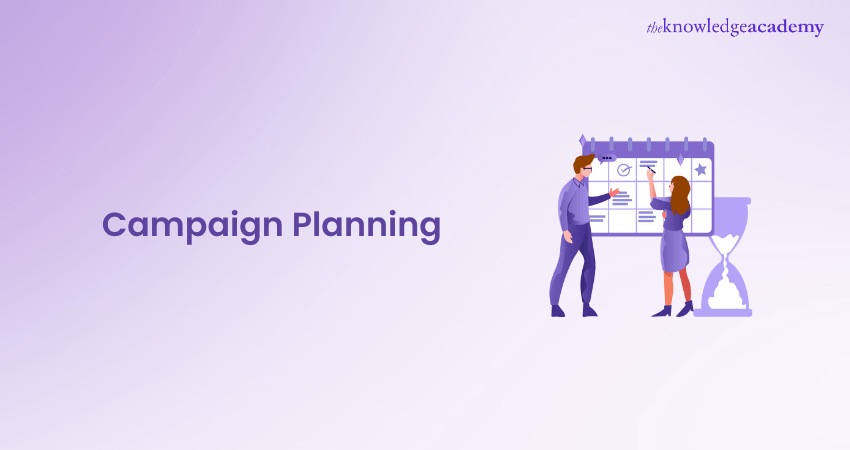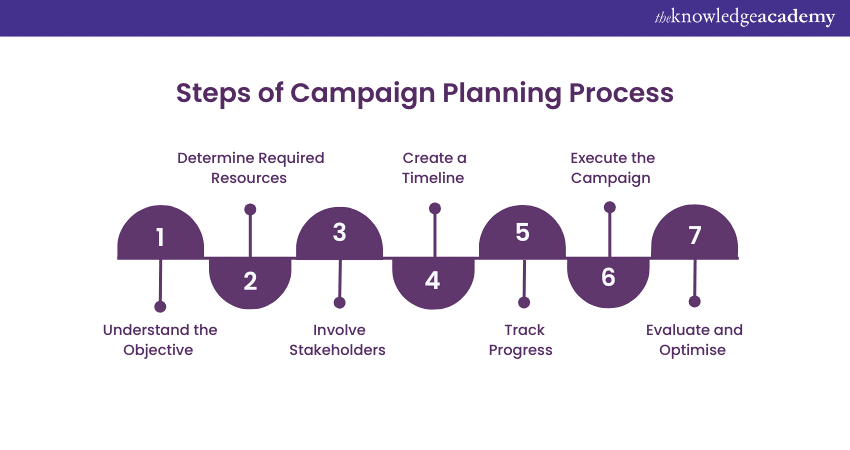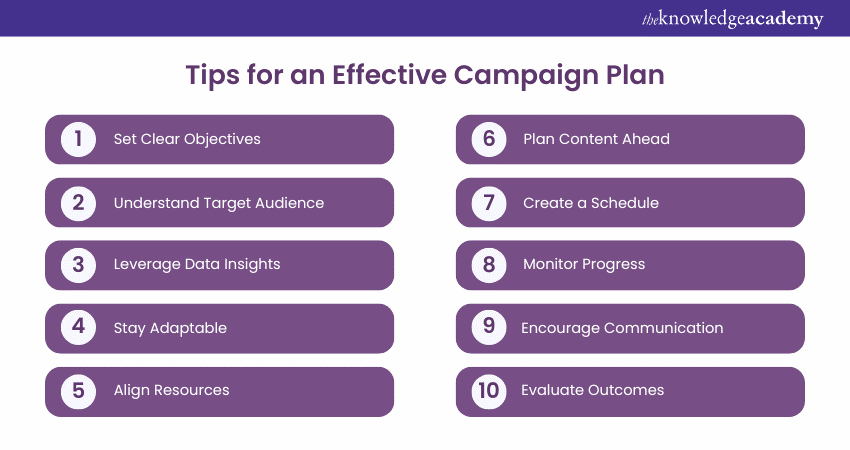We may not have the course you’re looking for. If you enquire or give us a call on +44 1344 203 999 and speak to our training experts, we may still be able to help with your training requirements.
Training Outcomes Within Your Budget!
We ensure quality, budget-alignment, and timely delivery by our expert instructors.

Are you looking to launch a successful Campaign that captures your audience’s attention and skyrockets your results? Discover the proven step-by-step guide to Campaign Planning that has helped countless marketers turn their ideas into winning strategies.
Imagine the satisfaction of seeing your Campaign outperform expectations with increased engagement, conversions, and ROI. Take the first step towards Campaign success by reading this blog, which is designed to lead you through every crucial stage of Campaign Planning.
Table of Contents
1) What is Campaign Planning?
2) Steps in the Campaign Planning Process
3) The Importance of Campaign Planning
4) Tips for an Effective Campaign Plan
5) Conclusion
What is Campaign Planning?
Campaign Planning entails setting goals, defining target demographics, and creating a thorough strategy for conveying impactful marketing messages. This procedure begins by establishing specific, quantifiable objectives that align with business goals, such as boosting brand recognition or enhancing sales performance. Afterwards, marketers examine their target audience to understand demographics, preferences, and behaviours, ensuring the message resonates with the planned recipients.
Furthermore, preparing for a Campaign involves conducting market research to evaluate competitors and industry patterns which influence the strategy. Creatives create engaging content and choose the right distribution channels, such as digital platforms, print media, or events.
Continuous monitoring and optimisation are essential during the Campaign to improve performance and reach desired results. By using information obtained from Data Analysis, marketers can adjust their techniques to increase interaction and conversions, leading to success in achieving their marketing objectives.
Steps in the Campaign Planning Process
Crafting an effective Campaign begins with a straightforward blueprint. Here’s a refined approach to structuring your Campaign plan:

Step 1: Understand the Objective
Begin by identifying the scope and resources required for your Campaign. To increase brand awareness, engage your Social Media team, brand managers, PR professionals, and content marketers.
Collaborating with your tech team may be crucial for incorporating sign-up forms onto your website to generate leads. The Campaign's goal will determine which stakeholders are involved.
Step 2: Determine Required Resources
Once you have established the Campaign's objective, determine the necessary resources for its successful implementation. Consider whether you need images, written content, fresh website pages, or Social Media updates.
Evaluate the Campaign's technical requirements and work with your marketing team to plan every stage. Clearly outline the marketing channels and types of content you can use.
Step 3: Involve Stakeholders
After finding the essential resources, involve stakeholders in the process. Precisely define your expectations from external partners or other groups. Use a Campaign Planning template to assign tasks to each member of your internal team and monitor their progress to ensure timely completion.
Step 4: Create a Timeline
After consulting with stakeholders, estimate how long each task will take and develop a schedule. Include deadlines for reviews and approvals, allowing adequate time between final approval and publication to accommodate potential setbacks.
For external freelancers or designers, set clear deadlines for asset reviews and final approvals, ensuring they are aware of the timeline.
Step 5: Track Progress
Ensure that your Campaign plan stays on course by closely monitoring the advancement of each individual step. Ensure that stakeholders consistently update the statuses of their tasks and have regular check-ins to pinpoint any bottlenecks. Consistent communication promotes clear understanding and keeps everyone on the same page during the Campaign Planning phase.
Step 6: Execute the Campaign
Once everything is in place, launch your campaign according to the planned schedule. Ensure all team members are aware of their roles and responsibilities during the execution phase.
Step 7: Evaluate and Optimise
After the campaign concludes, evaluate its performance against the set objectives. Analyse key metrics and gather feedback from stakeholders to identify areas for improvement. Use these insights to optimise future campaigns.
Take your business to the next level with our Digital Marketing Courses - Sign up now!
The Importance of Campaign Planning
A good marketing Campaign isn’t just about writing a few blogs on the same topic or creating related videos for Social Media. It’s a bunch of steps that all work together to meet a big goal for your business or marketing.
Think of it like a game plan for a big project, not just a one-time sale. There are lots of things to keep track of and a big target to hit, so you need to plan ahead. When you plan your marketing Campaigns smartly, you’ll:
1) Make sure you don’t skip important parts that could mess things up
2) Keep track of your money and know when to ask for more
3) Follow your plan so you don’t miss any big dates
4) Work with the right team to get the advice and help you need
So, with the right plan in place, your Campaign isn’t just a to-do list. It’s the roadmap that helps your business succeed.
Boost your online visibility and drive targeted traffic with our expert-led Search Engine Marketing (SEM) Training – Join now!
Tips for an Effective Campaign Plan
Want to make your Campaign plan effective? Here are some of the useful tips that will help you build a solid Campaign plan for your marketing goals.

Establish precise and quantifiable objectives that are in line with your business plan and ensure team alignment.
a) Study the demographics and preferences of your target audience in order to customise messaging appropriately.
b) Utilises analytics and market research to lead your strategy and decision-making.
c) Remain adaptable to making changes to your plan according to feedback and performance data.
d) Ensure that your budget and resources align with Campaign objectives, focusing on effective channels.
e) Prepare your content to ensure consistency and structure.
f) Create a schedule with important points and due dates, taking into account the possibility of changes and setbacks.
g) Monitor progress during the Campaign and have regular team meetings.
h) Foster open communication to enhance creativity and ensure collective success.
i) Examine Campaign outcomes in comparison to goals and collect learnings to enhance future performance.
Conclusion
Campaign Planning is a meticulous process that requires clear objectives, in-depth research, strategic content creation, and careful execution. By following the steps discussed in this blog, you can build Campaigns resonates with your audience and achieves your marketing objectives.
Increase your marketability and career opportunities in Digital Marketing with our Google Analytics Certification - Join now!
Frequently Asked Questions

The basic principles of Campaign Planning involve setting SMART goals, knowing your audience, crafting compelling messages, selecting appropriate channels, allocating resources effectively, and continuously monitoring and adjusting strategies.

Campaign Planning consists of three phases:
a) Pre Campaign: Focus on research and strategy development
b) Implementation: Execute tactics
c) Post Campaign: Analyse results and refine strategies

The Knowledge Academy takes global learning to new heights, offering over 30,000 online courses across 490+ locations in 220 countries. This expansive reach ensures accessibility and convenience for learners worldwide.
Alongside our diverse Online Course Catalogue, encompassing 17 major categories, we go the extra mile by providing a plethora of free educational Online Resources like News updates, Blogs, videos, webinars, and interview questions. Tailoring learning experiences further, professionals can maximise value with customisable Course Bundles of TKA.

The Knowledge Academy’s Knowledge Pass, a prepaid voucher, adds another layer of flexibility, allowing course bookings over a 12-month period. Join us on a journey where education knows no bounds.

The Knowledge Academy offers various Digital Marketing Courses, including the Marketing Course, Social Media Marketing Course, and Customer Acquisition Training. These courses cater to different skill levels, providing comprehensive insights into Campaign Optimisation.
Our Digital Marketing Blogs cover a range of topics related to Campaign Planning, offering valuable resources, best practices, and industry insights. Whether you are a beginner or looking to advance your Digital Marketing skills, The Knowledge Academy's diverse courses and informative blogs have got you covered.
Upcoming Digital Marketing Resources Batches & Dates
Date
 Campaign Planning Training
Campaign Planning Training
Fri 24th Jan 2025
Fri 21st Mar 2025
Fri 27th Jun 2025
Fri 29th Aug 2025
Fri 3rd Oct 2025
Fri 5th Dec 2025







 Top Rated Course
Top Rated Course



 If you wish to make any changes to your course, please
If you wish to make any changes to your course, please


